William Proctor:
For many comic fans, Alan Moore and Dave Gibbons’ Watchmen is a sacred, seminal text, one that perhaps should never be adapted nor extended with sequels, prequels etc., or else the sanctity of the original would be defaced in some way—at least in the minds of purists (of which I am one, admittedly). Although the concept of fidelity has been challenged since Robert Stam’s intervention in the early noughties, and rightly so, fidelity remains an enormous concern for many fans, often becoming a quarreling point across fannish discursive communities. I recall the online fury that accompanied DC’s decision to produce several prequel comic mini-series in 2012 with Before Watchmen, and before that, Zack Snyder’s film adaptation came under fire, in many accounts for being too slavishly faithful (although the ending of the comic was reconceptualized as well). While I don’t necessarily dislike either Before Watchmen or Snyder’s adaptation, I do feel that they missed the point of the original comic somewhat. Moore and Gibbons’ Watchmen operated as a keen examination of the superhero genre, leaving the figure of the superhero in ruins by the end. Indeed, Watchmen isn’t a celebration of superheroes, but rather a firm critique of them.
When I first learned the news that HBO would be producing a Watchmen TV series, with Damon Lindelof at the helm, I cringed. Worse still, HBO’s Watchmen wouldn’t be an adaptation of the original comic, but a continuation, a sequel that would begin thirty-odd years after the comics’ climax (although Lindelof describes it as a ‘remix’). It is worth noting that DC Comics have been publishing Geoff Johns’ and Gary Frank’s Doomsday Clock for almost two years at this point, another twelve-part series that functions both as a sequel to Watchmen, and a way to insert the characters into the DC Universe proper (Watchmen was not originally part of the official DC Universe shared by Superman, Batman, Wonder Woman et al). Effectively, this means that there have been two disconnected sequel series running simultaneously, at least since HBO’s Watchmen debuted in October 2019, both of which will conclude in the week beginning December 16th. I’m not absolutely certain, but having parallel, yet narratively disconnected, continuations unfolding at the same time may be a first.
I didn’t watch the HBO series for a while. I didn’t care, seeing it as another cynical assault on Watchmen’s cultural status (purist that I am). Boy, was I wrong! Hearing from others about HBO’s Watchmen being actually quite wonderful initially bothered me, so I felt I should dive in (buoyed by a certain degree of pre-ordained schadenfreude, granted). Being firmly hoisted by my own fannish petard, I would say that it is perhaps the finest TV series of 2019. Unlike Doomsday Clock, which largely aims to tap into Moore and Gibbons’ voices by obsequiously reproducing its aesthetic, its style, and its mode of address—so much so that it is more a fine ventriloquist performance than anything else—HBO’s Watchmen is inventive, politically astute, and courageous.
What were your first impressions of the news that Watchmen would be continued as a television series, Will?
Will Brooker:
I agree with much of your summary above. When I first heard about the HBO show, I assumed it would be a new adaptation of the graphic novel, a re-do that would take advantage of the serial television format to spend more time with the original story than Snyder had been able to with his 2009 movie. I’ve certainly heard it said before that Watchmen could never be successfully adapted to cinema, but that it would suit a twelve-episode TV show. So, I was fascinated and cautiously optimistic.
When I learned it was a sequel, my reaction was very similar to yours; that this was an opportunistic and misguided decision. The trailers, offering a montage of brief images — mobs in Rorschach masks, a pirate flag, clock hands approaching midnight — seemed like a series of obvious, easy call-backs to the original, given an uninspired and uninspiring twist. Combine that with a funeral scene evoking the start of Moore and Gibbons’ second chapter, and a soundtrack obliquely commenting on the action, like the use of lyric quotations in the graphic novel, and indeed the Smashing Pumpkins track on the trailer for Snyder’s movie, and overall it struck me as cynical; unnecessary at best.
My reaction was also influenced by the fact that Moore obviously hadn’t wanted any sequels or spin-off Watchmen texts himself. He and Gibbons had seriously considered two possibilities as far as I remember from the late 80s — ‘Rorschach’s Journal’ and ‘The Comedian in Vietnam’ — but Moore had decided not to go ahead with them (Gibbons’ attitude towards adaptations and sequels is very different) and as far as he was concerned, the story was complete at the end of the graphic novel. It’s well known that Moore feels he was mistreated by DC, who I believe reissue new editions of Watchmen just often enough to keep the copyright from returning to the original creators, and he’s been equally frank about his antipathy towards adaptations or continuations of his own work. I enjoy aspects of Snyder’s Watchmen — I think parts of it are really well done, and find pleasure in seeing favourite scenes from the graphic novel translated to film, though as a whole it’s certainly flawed — but Before Watchmen proved Moore absolutely right in my opinion. He openly expressed his distaste about the concept and his lack of respect for the people involved, and I feel that the series, though it included some very fine artwork and stories that would have been nice enough in a different context, didn’t just fall flat but damaged the sense of what ‘Watchmen’ means. My attitude towards spin-offs is that poor ones don’t just add nothing, but subtract something: they dilute and weaken the concept. When we talk about ‘Watchmen’ now, we either have to specify that we mean the original graphic novel only, or include what I think is a mediocre and misguided set of prequels. (The same could be said of other franchises, like Star Wars and Harry Potter; I had serious misgivings about Blade Runner 2049 for the same reason, though fortunately the sequel movie itself was far, far better than I’d feared).
But even more specifically and recently, my expectations about the HBO series were shaped by Doomsday Clock, which I feel suffers from the same problems as Before Watchmen, but more so. It’s a risky idea, clumsily executed from what I’ve read — I bought it up to issue 8 and resent the money I spent on it; it may possibly have improved since — which again, to me, undermines the sense of what ‘Watchmen’ means. I don’t agree with you that it’s a fine ventriloquism. I’d see it more as a zombie re-animation of Moore and Gibbons’ characters and concepts, controlled by a puppet-master who is probably entirely competent at superhero stories but who nevertheless falls very far short of Moore on every level: dialogue, narrative captions, formal structure, emotional involvement, compelling ideas, fundamental storytelling. As with Before Watchmen, the art is technically accomplished, but for me that’s like pretty make-up on a corpse. Watchmen and Doomsday Clock, in fact, convince me that Francois Truffaut made a good point with his distinction between a cinematic auteur and a metteur-en-scene: an artist whose recurring motifs and themes run through all their work and transcend everything they touch, as opposed to a basic craftsman who turns in a decent but uninspiring commercial job. I say this not as an uncritical fan of Moore, by any means; I’m not especially fond of his more recent work, and he in turn has been scathing towards me in one of his many ‘last interviews’.
So that was how I approached HBO’s Watchmen, until I actually saw the first episode. I very quickly reconsidered, and as I write, just before the finale, I think it’s improved each week, building into a remarkable TV series and a very intelligent, original and surprising take on the original graphic novel. This is a pretentious way of putting it, but perhaps the lesson there is ‘don’t let a metteur-en-scene write the sequel to an auteur’s masterpiece’, and that Lindelof has proven himself an auteur.
William Proctor:
I think the distinction between metteur-en-scene and a bonafide auteur is worth considering further. Correct me if I’m wrong, but it seems that you’re saying that it’s entirely possible for a creator to be an auteur even if they are, in essence, working on something that originated from someone else’s creative vision. I think that’s an interesting way to look at it considering that debates about auteurism and authorship remains very much alive in academic circles. Roland Barthes may have a lot to answer for with his essay on ‘The Death of the Author,’ which I don’t believe Barthes actually embraced himself wholeheartedly but mobilized it to query and question the role of authors in the construction of meaning. In your Hunting the Dark Knight: Twenty-First Century Batman (2012), you partly drew upon Barthes to examine the way in which Christopher Nolan’s authorial imprimatur was developed over time—one might say ‘diachronically’—and the way in which the director ‘remixed’ various elements from Batman’s history to create an assemblage comprised of the old and new. While Barthes prefers the term ‘scriptor’ to describe the way in which creators are like cultural kleptomaniacs, indiscriminately thieving from others in an unoriginal but endless chain of intertextuality, I’ve always felt that the term is a little insulting (although I recognize Barthes was issuing a provocation, to a large degree). Yet in your assessment of Nolan, you rightly argue that his role as author is more complex and complicated than outright plagiarism. On the one hand, Nolan may certainly be viewed as a quintessential Barthesian scriptor, ‘selecting and stitching together elements from existing Batman texts into a new tapestry,’ as you put it. Yet on the other, and as you argue, ‘the art and act of creation lies in assemblage, an awareness of intertextual contexts, and a contribution to a broader, cultural conversation, rather than a claim to pure invention’ (2012, 147). In a sense, I think this assessment redraws the auteur/ scriptor distinction that Barthes makes by recognizing that assemblage is where authorship lies as opposed to the overwrought, romantic idea of an author-God giving birth to culture ex nihlo. (I am thinking that scriptor and metteur-en-scene share common principles as essentially remixers).
Although Alan Moore is certainly thought to be an auteur in comic book terms, and certainly has a reputation as an author-God, it has always struck me as quite odd to reject adaptations and extensions of his work as Moore has always been an indiscriminate plunderer. Moreover, Moore’s stance has been not only to eschew DC’s exploitation of characters and stories he authored—or co-authored to give artists their due—but has also refused to accept profits from adaptations of his work. Indeed, Dave Gibbons currently receives all monetary reward for Watchmen extensions and spin-offs. We must not forget that Watchmen began as a riff on superhero characters from Charlton Comics, which DC had purchased in 1983, before becoming its own beast. That being said, Moore still drew inspiration from the Charlton superheroes: The Question becomes Rorschach; Nite Owl is based on Blue Beetle; Silk Spectre draws from Night-Shade; Ozymandias from Thunderbolt, etc. But it doesn’t stop there! Moore’s Nite Owl also refers to Batman, as does Rorschach; Dr Manhattan is a Superman analogue taken to extremes, but also shares characteristics with the Incredible Hulk, most notably with his origin story, as well as Charlton’s Captain Atom. Interestingly, Geoff Johns has followed Moore in Doomsday Clock, with new characters Mime and Marionette being based on Charlton’s duo Punch and Jewelee from 1967.
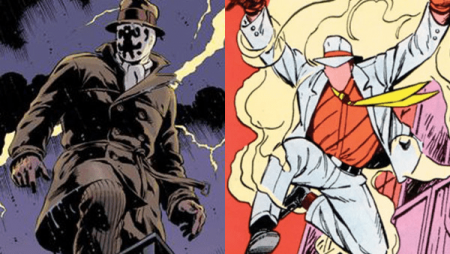 Throughout Moore’s career, he has ransacked cultural history, almost without exception. Obviously, much of his work-for-hire on DC, Marvel, and Image titles has often meant that Moore was working on already-existing characters and properties, such as Supreme, a thinly-veiled analogue of the Silver Age Superman; 1963, his six-part homage to the Silver Age; his run on Swamp Thing; and the widely popular Batman tale, The Killing Joke. That aside, however, Moore’s work outside mainstream comic publishing has also tended to borrow tropes, characters and motifs from cultural history, the most obvious example being the League of Extraordinary Gentlemen, a team of heroes that includes Oscar Wilde’s Dorian Gray, Mina Harker from Bram Stoker’s Dracula, H. Rider Haggard’s Allan Quatermain, Robert Louis Stevenson’s Jekyll and Hyde, and so on and so forth. More recently, Moore and Jacen Burrows’ Providence is an undisguised love-letter to H.P Lovecraft, which also draws significantly from the Cthulhu Mythos, and by extension, augments it as well. It’s worth noting that Moore seems to only use characters and properties that are in the public domain.
Throughout Moore’s career, he has ransacked cultural history, almost without exception. Obviously, much of his work-for-hire on DC, Marvel, and Image titles has often meant that Moore was working on already-existing characters and properties, such as Supreme, a thinly-veiled analogue of the Silver Age Superman; 1963, his six-part homage to the Silver Age; his run on Swamp Thing; and the widely popular Batman tale, The Killing Joke. That aside, however, Moore’s work outside mainstream comic publishing has also tended to borrow tropes, characters and motifs from cultural history, the most obvious example being the League of Extraordinary Gentlemen, a team of heroes that includes Oscar Wilde’s Dorian Gray, Mina Harker from Bram Stoker’s Dracula, H. Rider Haggard’s Allan Quatermain, Robert Louis Stevenson’s Jekyll and Hyde, and so on and so forth. More recently, Moore and Jacen Burrows’ Providence is an undisguised love-letter to H.P Lovecraft, which also draws significantly from the Cthulhu Mythos, and by extension, augments it as well. It’s worth noting that Moore seems to only use characters and properties that are in the public domain.
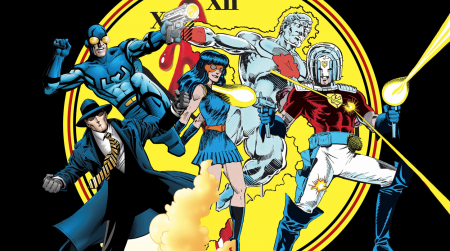 I largely agree with your assessment about Doomsday Clock, but I wonder whether Geoff Johns’ ‘zombie reanimation’ of Moore and Gibbons—you’re right, that’s a better (although harsher) metaphor than ventriloquism—is similar to Moore’s career trajectory in general. What makes Moore an auteur while Johns is a (mere?) metteur-en-scene? Clearly, Moore didn’t create Watchmen alone—Gibbons cannot be denied co-authorship, and let’s not forget John Higgins’ colouring. (Both Gibbons and Higgins have at times articulated their frustrations at the comic being described as Alan Moore’s Watchmen, without referencing their artistic achievements.)
I largely agree with your assessment about Doomsday Clock, but I wonder whether Geoff Johns’ ‘zombie reanimation’ of Moore and Gibbons—you’re right, that’s a better (although harsher) metaphor than ventriloquism—is similar to Moore’s career trajectory in general. What makes Moore an auteur while Johns is a (mere?) metteur-en-scene? Clearly, Moore didn’t create Watchmen alone—Gibbons cannot be denied co-authorship, and let’s not forget John Higgins’ colouring. (Both Gibbons and Higgins have at times articulated their frustrations at the comic being described as Alan Moore’s Watchmen, without referencing their artistic achievements.)
What is it that makes Watchmen the seminal text that is? I came to the comic much later than when it was first published, so I was already aware that it was considered a work of art, and perhaps more pointedly, a work of literature (thanks to Time Magazine including the comic in its list of the 100 best novels, a paratext that has accompanied Watchmen ever since). So, I was ‘contaminated’ from the beginning, one might say. I wonder how it was received in the 1980s as it was published monthly. Were people aware that this was ‘something special’?
Firstly, yes, I realise I was erasing Higgins; listing three names is unwieldy, but that’s no excuse. Higgins adds a great deal to the work, though there exists is a luxury Annotated version of Watchmen that reproduces the art in black and white, as if this is somehow purer.
With regard to Barthes, though he was using the word ‘auteur’ in his original French, he wasn’t talking about film auteurs but literary authors, so he wasn’t actively participating in the ongoing discussion about directors. I think it was probably more provocative and shocking at the time to propose that someone like Balzac was not an author but a ‘scriptor’, someone who could only draw on what had already been said, than it would have been to say the same about someone like John Ford. The Searchers is accepted as a masterpiece and Ford is celebrated as an auteur within cinema. But Ford was working from someone else’s script, which in turn was adapted from a novel; he was producing commercial product under a contract with Warner Bros, within an established genre, and was able to draw on its available, familiar tropes, themes and iconography. Ford’s characteristic imagery and compositions were at least partly thanks to his cinematographer, and a great deal of the film’s power comes from the star persona of John Wayne. So, it’s far easier, I think, to see Ford as a ‘scriptor’ in Barthes’ sense than it might be to apply the same argument to a novelist, whom people still tend to imagine working alone, creating ideas from their heads with no interference. The French New Wave theorists like Truffaut originally praised directors who worked within the American commercial studio system, often with scripts they hadn’t chosen, but who nevertheless imprinted their style and personality onto the finished work. I think the same point could easily apply to Alan Moore, writing a generic superhero maxi-series for DC Comics with a team of other creative individuals. He can be described as a scriptor in Barthes’ sense, but I don’t think that rules out him being an auteur in Truffaut’s sense as well. As for metteur-en-scene, I think that term implies someone competent but not outstanding, who gets the job done but doesn’t have that, since we’re talking about French theorists here, je ne sais quoi: Andrew Sarris struggles to define it, and I think comes up with vague terms like the ‘elan’ and the ‘temperature on the set’. Essentially, it’s a certain something that means the work transcends its generic, commercial form.
I first encountered Watchmen around the time of issue 6, when I met a cool, floppy-haired indie boy at a writing summer school in Central London, and he led me to Forbidden Planet — which was then a dingy, crowded little store — and insisted that I read it. I distinctly remember him saying ‘Rorschach’, adding knowingly ‘that’s how you pronounce it.’ That sounds like the start of a teen love story, and in a way, it was: between me and Watchmen. Nevertheless, I didn’t start picking up the monthly issues, and waited until it was in trade paperback before buying it and reading the whole thing in one thrilling session. I went back to purchase issue 6 once I’d finished it, as a souvenir of my first encounter.
There was certainly a sense by halfway through the series that it was something special among comic book fans like my floppy-haired friend, and also, once it was complete, that it was breaking boundaries into the broader public consciousness. The trade paperback was displayed in mainstream bookstores like Foyles, and there was a general feeling that it was a cultural phenomenon or at least a curiosity — a comic book for adults, a ‘graphic novel’, an oddity you should check out if you wanted to be up to date. I remember it being featured on a late night book discussion programme, perhaps on BBC2 or Channel 4, where they missed the point and made superficial, silly comments about ‘this one character with inkblots on his face.’ There was an extensive roundtable discussion in my favourite fanzine, Fantasy Advertiser, with Moore and Gibbons (again, not Higgins) interviewed at great length and in great depth about plot details and recurring motifs.
 I think its significance probably crept up gradually on comics fans, though I may be wrong: Moore certainly had enough of a previous reputation from Swamp Thing for regular DC comics readers to know that this was going to be something great. I don’t think anyone grasped its scope and ambition right away, though, because it takes several chapters for the patterns and structure, and the complexity of the plot, to become clear. On a personal level, it consumed my imagination for years immediately afterwards, and I still see it very much as a landmark of my cultural life. Just as a small but telling indication of its importance to me, I wore a bloodstained smiley badge on my long black coat all through my undergraduate degree at UEA, and on my first day at university, an older lad came up to me: ‘you don’t know me, but you like Watchmen, don’t you?’ He is still a pal of mine, decades later.
I think its significance probably crept up gradually on comics fans, though I may be wrong: Moore certainly had enough of a previous reputation from Swamp Thing for regular DC comics readers to know that this was going to be something great. I don’t think anyone grasped its scope and ambition right away, though, because it takes several chapters for the patterns and structure, and the complexity of the plot, to become clear. On a personal level, it consumed my imagination for years immediately afterwards, and I still see it very much as a landmark of my cultural life. Just as a small but telling indication of its importance to me, I wore a bloodstained smiley badge on my long black coat all through my undergraduate degree at UEA, and on my first day at university, an older lad came up to me: ‘you don’t know me, but you like Watchmen, don’t you?’ He is still a pal of mine, decades later.
William Proctor:
This was the time, of course, that the term ‘graphic novel’ gained a lot of traction, with comics receiving at least some praise in mainstream media as having ‘grown up.’ Although I agree with Roger Sabin that this was largely ‘a seductive interpretation of events’, and ‘one of the recurring clichés of arts journalism’, I think that Watchmen being recognized as creatively radical and innovative is richly deserved. Although it’s not a ‘graphic novel’ per se—like most superhero comics up to that point, it was published in monthly instalments—so it’s more a trade compendium than a novel (in strict terms). Yet it’s clear to me that Watchmen is like a Charles Dickens novel in form, being released serially before being collected as a unity. And it is most definitely a unity. Most superhero trade collections include work from multiple authors, artists, and illustrators, sometimes with multiple stories, all bound within a single volume to pretend that they’re ‘graphic novels’—but they’re not. When you and I were discussing HBO’s Watchmen elsewhere, I was especially taken by something you said: that it is quite remarkable that one person wrote the comic book, whereas HBO’s Watchmen is largely, a collaborative enterprise, with Lindelof as creative controller. Like all TV series, Lindelof assembled a writers’ room to break stories for episodes. I’m not trying to detract from Lindelof’s accomplishments as showrunner and chief architect on the series, just that I also find it exceptional that one person created Watchmen (not forgetting Gibbons and Higgins’ creative agency).
When I first read Watchmen in the late-90s, I don’t think I ‘got it,’ at least not entirely. I may have understood the story, but I was not yet well-informed enough about either the medium or the genre to fully grasp its granularities and complexity. I tend to think of it like my early relationship with Blade Runner, a film that I detested as a ten-year-old who wanted nothing more than Harrison Ford as Han Solo, but has since become one of my favourite films. Each time I screen Blade Runner for students, I learn more about the film, and re-interpret it all over again. It’s only recently that I’ve come to recognize Stanley Kubrick’s adaptation of The Shining for what it is: a great Kubrick film and a truly awful adaptation of the Stephen King novel. In his Show Sold Separately, Jonathan Gray emphasizes that interpretation is never finished, that we continuously re-interpret cultural texts as our personal contexts shift. Watchmen is one of those texts that will probably always be incomplete for me, in an interpretative sense: I still come across elements that force me to reconceptualize how I think about the story, its themes, its analogies, and its metaphors.
I’ve come to believe that one must have at least a modicum of knowledge about superhero comics to better understand what Moore is responding to, and critiquing (I could be wrong). I recall lending Watchmen to someone who insisted that comics were mainly for children, or for adults who simply haven’t grown up yet (we all must put aside childish things, after all). I thought that I could change their mind about the medium by recommending Watchmen. I was so wrong! Not that they said it was kid’s stuff, but that it was impenetrable, self-indulgent, and mindless. My experience seems to be shared by others, such as Walter Hudsick, who in an essay titled ‘Reassembling the Components in the Correct Sequence: Why You Shouldn’t Read Watchmen First’, argued that
you might have borrowed a copy from a longtime fan; they probably thought it was a great service to lend it to you. If so, that well-intentioned generosity may have been ill-advised. Reading Watchmen is not your best introduction to the comics idiom. Unless you’re a comics fan, you won’t have the fluency in the comics form and familiarity with the superhero genre required to unlock the story’s hidden messages.
Passing Watchmen onto someone who is not au fait with superhero comics (or for that matter, comics in general) is like giving Alan Resnais’ Last Year in Marienbad to someone who has never watched a film before. I recognize that may seem as if I’m claiming some kind of superior intelligence on my part, but that couldn’t be further from the truth. I really had to work hard to grasp Watchmen, and even now as I re-read it, I realise that it’s not at all like the vast majority of contemporary superhero comics, which can be read in ten minutes or so. Watchmen demands attention and focus (which is not to argue that complexity equals genius, of course).
Will Brooker is Professor of Film and Cultural Studies and Head of the Film and Television Department at Kingston University, London. Professor Brooker’s work primarily studies popular cinema within its cultural context, situating it historically and in relation to surrounding forms such as literature, comic books, video games, television and journalism. In addition to the numerous essays and articles on film and fan culture that he has published, his books include Why Bowie Matters (2019), Forever Stardust: David Bowie across the Universe (2017), Star Wars (2009), Alice’s adventures: Lewis Carroll in popular culture (2004), Using the Force: Creativity, Community and Star Wars Fans (2002), and the edited anthologies The Blade Runner Experience (2004) and The Audience Studies Reader (2003). He is also a leading academic expert on Batman and the author/editor of several books on the topic, including Batman Unmasked (2000) Hunting the Dark Knight (2012), Many More Lives of the Batman (2015).
William Proctor is Principal Lecture in Film and Transmedia at Bournemouth University. He is co-editor on the books, Global Convergence Cultures: Transmedia Earth (with Matthew Freeman, for Routledge 2018), and Disney’s Star Wars: Forces of Production, Promotion and Reception (with Richard McCulloch, for University of Iowa Press, 2019). William is a leading expert on reboots, and is currently writing a monograph on the topic for Palgrave titled Reboot Culture: Comics, Film, Transmedia. He has published on a wide-range of topics, including Star Wars, Batman, James Bond, Stephen King, and more.



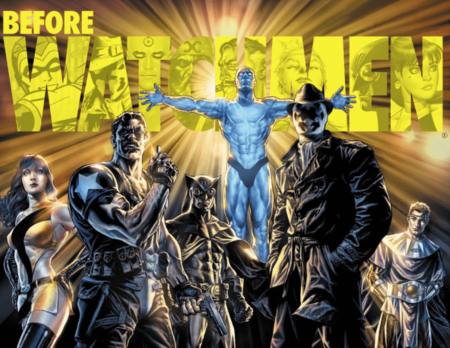
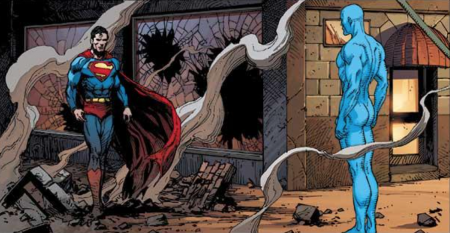





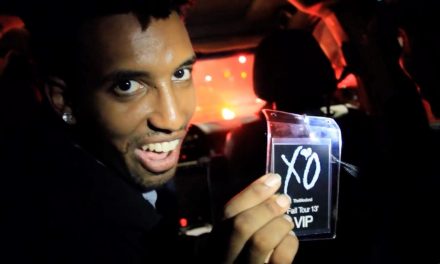
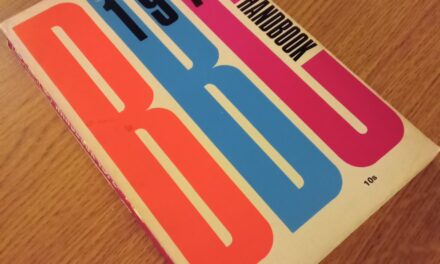
Happy New Year Will and William! 🙂
Thank you for this fascinating read. As yet, I’ve not seen any of the acclaimed TV version due to a) availability and b) not enough hours in the day… so I’ve not progressed beyond the first few paragraphs of Part Two of your articles… but Part One was very enjoyable and brought back so many happy memories of the late 1980s as I discovered that comics *were* capable of growing up *with* me, and things like “V for Vendetta” and particularly “Marvelman”/”Miracleman” were taking some of the notions that I’d become familiar with in the art form to a whole new level. Very exciting times for me – and even now they’re still graphic novels that I return to time and time again.
Your enthusiasm overpowering your scepticism bodes well for my enjoyment of this new version of “Watchmen” when it finally comes to a screen near me and has whetted my appetite immensely. I look forward to reading Parts Two and Three as soon as I’ve had a chance to catch up!
Much appreciated!
All the best
Andrew